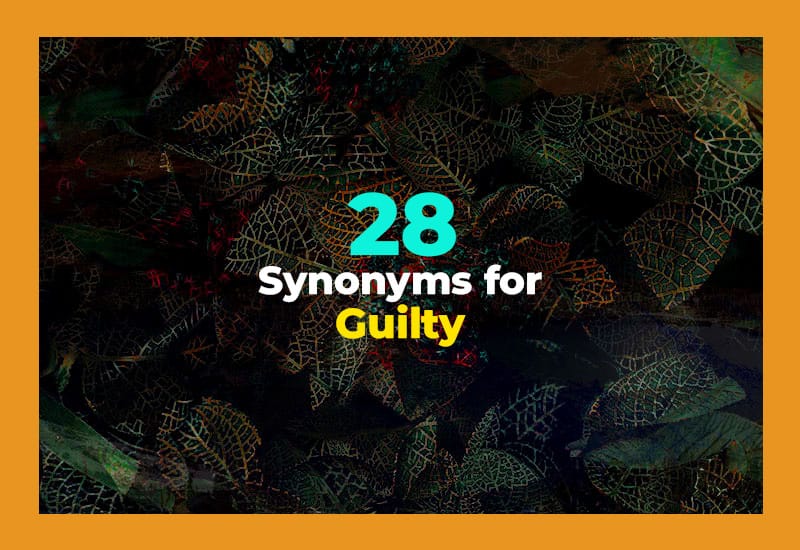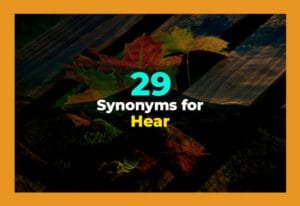You know that weird, heavy feeling in your chest after doing something wrong? Maybe you broke a rule, lied to someone, or made a mistake. That feeling is what we call "guilty." But there are so many different ways to say it—like ashamed, at fault, or regretful. These words can describe how we feel inside or how others see us. In this post, we'll explore other simple words that mean the same as guilty, with examples to help you understand and use them easily.
1. Ashamed
When someone is ashamed, they feel bad about something they did. It's a strong emotion that shows a person knows they did wrong and wishes they hadn't. For example, "She was ashamed of lying to her best friend." This word is used when someone feels personal pain or embarrassment because of their actions. It's more about inner feelings than what others think. People often feel ashamed after hurting someone or breaking their own values. If you feel ashamed, it means your heart knows right from wrong and wants to do better next time.
2. At fault
If someone is at fault, they are the person responsible for a mistake or bad situation. It simply means they did something wrong, even if they didn't mean to. For example, "The driver was at fault for the accident." This phrase is used in everyday situations, like at school, work, or even in sports. Being at fault doesn't always mean someone did it on purpose. It just means they were the cause of the problem. It's a good way to explain who caused an issue in a fair and clear way.
3. Blameworthy
Blameworthy means that someone deserves blame for what they did. If someone is blameworthy, it means they should be held responsible for their actions. For example, "He was blameworthy for not helping during the emergency." This word sounds a little formal, but it's useful when you want to make it clear that someone did something wrong and can't avoid being blamed. People use blameworthy in school reports, news articles, or serious talks when they want to explain fault in a more respectful way.
4. Culpable
Culpable is another way to say someone is responsible for doing something wrong or bad. It is often used in legal or formal situations. For example, "The manager was found culpable for the missing money." When someone is culpable, they are guilty of an action that hurt others or broke rules. This word is helpful when talking about serious issues, like in court or at work. Culpable is stronger than just saying someone made a mistake. It means they truly had a part in what went wrong and should answer for it.
5. In the wrong
When someone is in the wrong, they made a mistake or did something unfair. It's a simple phrase that people often use in everyday conversations. For example, "I was in the wrong for yelling at my friend." This phrase helps people admit their fault without sounding too formal or harsh. It shows honesty and a wish to fix the situation. If someone says they're in the wrong, it usually means they know what they did wasn't right and they feel bad about it.
6. Regretful
If someone is regretful, they feel sorry about something they did and wish they could take it back. For example, "He was regretful about not attending his grandma's birthday." This word talks about deep feelings after a mistake. It's more than just knowing you did wrong—it's about wishing you hadn't. People feel regretful when they miss chances, hurt others, or fail to do the right thing. It's a natural part of learning and growing. Saying you feel regretful shows others that you care about what happened.
7. Remorseful
Remorseful means someone feels deep sadness and guilt over something they've done. It's often used when someone really wants to make things right. For example, "She felt remorseful after cheating on the test." Remorse is a strong feeling that sticks with you. It's not just about being caught—it's about truly feeling bad inside. People who are remorseful often try to apologize and fix the damage they caused. It's a powerful word that shows someone is being honest and wants to do better in the future.
8. Sorry
Being sorry is one of the simplest ways to say you feel guilty or bad about something. For example, "I'm sorry for hurting your feelings." It's a word we all use when we mess up, whether it's small or big. Saying sorry doesn't always fix everything, but it shows that you care and are willing to take responsibility. It's also a way to start healing or making peace. Sorry can be said in person, in writing, or even with actions. It's a small word with a big meaning.
9. Responsible
Responsible means someone has to answer for something they did. For example, "He was responsible for the broken window." Being responsible doesn't always mean someone did something wrong on purpose. It just means they were in charge or caused the result. When used in a guilty way, it shows that someone made a mistake or let something bad happen. Being responsible can be hard, but it also shows maturity. Owning up to what you've done is a big step toward making things right.
10. Caught
When someone is caught, it means they were found doing something wrong. For example, "She was caught stealing candy from the store." It doesn't always mean they feel guilty, but it means others know what they did. Being caught often brings guilt because now everyone sees the mistake. It's a strong word that shows a moment when someone's actions are no longer a secret. Being caught can be scary, but it's also a chance to be honest and fix the wrong.
11. Confessed
Confessed means someone admitted to doing something wrong. For example, "He confessed to breaking the vase." When someone confesses, it shows they're honest and ready to face the truth. This word is often used in police stories or in personal talks. It's a brave thing to do, because it means someone is taking responsibility. Confessing can help others forgive and understand. It's one way people show they feel guilty and want to do better.
12. Accused
When someone is accused, it means others say they did something wrong. For example, "She was accused of cheating on the test." Being accused doesn't always mean the person is guilty—it just means people believe they did something bad. Sometimes people are wrongly accused, and other times, it's true. The word is often used in court, school, or arguments. It's a serious word that can make someone feel scared or defensive. But if someone is truly guilty, being accused can lead to admitting the truth.
13. Convicted
Convicted means a person has been found guilty by a court. For example, "The man was convicted of theft." It's a legal word used when a judge or jury decides someone committed a crime. This is a strong and serious way to say someone is guilty. Being convicted means there is proof, and the person must face a punishment. It's not just about feelings—it's about real decisions and justice. Convicted is often used in news, police reports, or legal documents.
14. Wrong
Wrong is a simple and common word used when someone does something that's not right. For example, "I knew it was wrong to lie." It's a strong way to talk about guilt, because it clearly says the action was bad. Wrong can be about rules, morals, or just hurting someone. It's often used in lessons, stories, or advice. Admitting something was wrong shows a person understands the mistake and wants to change. It's a clear, everyday word that helps us talk about guilt easily.
15. Caught red-handed
Being caught red-handed means being caught in the act of doing something wrong. For example, "He was caught red-handed taking money from the drawer." It's a fun phrase, but it means serious trouble. It's used when someone is seen doing something bad at the exact moment it's happening. This phrase paints a clear picture, like someone with their hand still in the cookie jar. It shows guilt without any question. People use it to describe moments when someone can't deny what they did.
16. Dishonest
A dishonest person is someone who doesn't tell the truth or cheats. For example, "It was dishonest to hide the broken vase." Being dishonest usually leads to feelings of guilt, because the person knows they weren't truthful. It's a strong word that talks about character, not just actions. People who act dishonestly often feel bad later and try to make things right. It's important to be honest, even when it's hard. That way, you can avoid feeling guilty or ashamed later.
17. Wrongdoing
Wrongdoing is a word for bad or illegal behavior. For example, "The company was punished for serious wrongdoing." It's used when someone breaks rules or does something harmful. It can be small, like lying, or big, like stealing. This word is used in both daily life and legal talks. Saying someone committed wrongdoing means they are guilty of something that wasn't right. It helps describe actions that lead to guilt, shame, or punishment.
18. Self-blaming
When someone is self-blaming, they blame themselves for something, even if it's not all their fault. For example, "He kept self-blaming after the accident." This feeling often comes from guilt and regret. Sometimes, people are too hard on themselves and feel more guilt than they should. Self-blaming can hurt your self-esteem, even if you didn't mean to do anything wrong. It's important to learn from mistakes without holding too much guilt inside.
19. Shamefaced
Shamefaced means looking or feeling very guilty and embarrassed. For example, "She gave a shamefaced smile after breaking the glass." It shows in the way someone acts or looks—maybe they avoid eye contact or speak quietly. This word is useful when describing someone who clearly feels bad about what they did. It's more about body language than words. Shamefaced people often want to make things right but don't always know how.
20. Answerable
If someone is answerable, it means they must explain their actions and take responsibility. For example, "He is answerable to the boss for the mistake." This word is often used in formal or work settings. Being answerable means someone is guilty or responsible and must answer questions about what happened. It's a respectful way to say someone did something wrong and needs to fix it.
21. Liable
Liable means legally or officially responsible for something bad that happened. For example, "The company is liable for the damage." It's often used in court or business settings. If someone is liable, they are seen as guilty and must pay for or fix the problem. This word is important in rules and laws. Being liable doesn't always mean the person did something on purpose, but they still have to take the blame.
22. Condemned
Condemned means officially judged as guilty or bad. For example, "The criminal was condemned for his actions." It's a strong word that is often used in court or religion. Being condemned means others have decided you did something wrong and should be punished. It's a serious form of guilt that comes with judgment and sometimes punishment. People can also feel personally condemned, even without others saying so.
23. Disgraced
If someone is disgraced, they've lost respect because of something wrong they did. For example, "The player was disgraced after the cheating scandal." This word shows how guilt can change how others see you. It's a painful word because it means shame in public. Being disgraced can come from lies, crimes, or breaking rules. It often leads to regret, sadness, and a desire to make things right.
24. Penitent
A penitent person feels very sorry and wants to fix what they did. For example, "He looked penitent after yelling at his mom." This word is a bit formal, but it shows someone has a soft heart and wants to change. Being penitent means not only feeling guilty but also being willing to do better. It's often used in religion or old stories, but it still matters today.
25. Apologetic
When someone is apologetic, they feel bad and say sorry. For example, "She was apologetic after breaking the promise." This word shows both guilt and a kind heart. It's often used when someone admits a mistake and wants forgiveness. People can be apologetic in speech, letters, or actions. It's a polite and caring way to show guilt and make peace.
26. In disgrace
Being in disgrace means others have lost respect for you because of something wrong you did. For example, "The singer left the stage in disgrace." It's like being publicly shamed or embarrassed. This phrase shows deep guilt and how it affects a person's image. It's serious and often leads to big changes or apologies.
27. Dishonorable
A dishonorable person has done something shameful or not respectful. For example, "Cheating in the game was a dishonorable act." This word shows guilt and a lack of fairness. It's often used in sports, school, or important duties. Dishonorable actions bring guilt and a need to restore trust.
28. Incriminated
Incriminated means someone has been shown to be guilty of a crime or mistake. For example, "The video incriminated the thief." It's a legal word used when there's proof of guilt. Being incriminated means someone can't deny what they did. It shows guilt clearly and can lead to punishment or apology.

Final Thoughts
Feeling guilty is part of being human. We all make mistakes, feel regret, or wish we had done things differently. These 28 synonyms give you many ways to talk about guilt, from simple everyday words to more serious ones. Understanding these words helps us express ourselves better and connect with others. Remember, guilt is a sign that we care and want to do better. It's not the end—it's a step toward change, learning, and healing.









